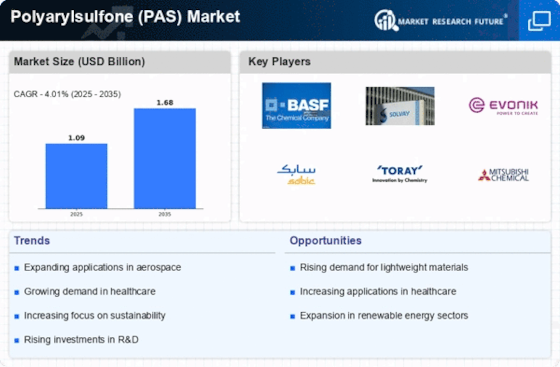Top Industry Leaders in the Polyarylsulfone Market

Strategies Shaping the Game:
-
Product Diversification: Leading players like Solvay, Sumitomo Chemicals, and Evonik Industries are expanding their product portfolios beyond standard PSU grades. This includes developing heat-stabilized grades for automotive applications, biocompatible grades for medical devices, and flame-retardant grades for electronics. Such diversification caters to niche needs and strengthens market presence. -
Vertical Integration: Integrating upstream or downstream operations is another crucial strategy. Companies like Asahi Kasei are strengthening their raw material production to secure supply chains and optimize costs. Meanwhile, Solvay's acquisition of Microtex, a specialist in high-performance polymer films, allows them to offer downstream solutions, enhancing customer value. -
Technological Advancements: Continuous research and development are key to unlocking new applications and optimizing production processes. Solvay's focus on advanced polymerization techniques and Asahi Kasei's investment in membrane technology are prime examples. These advancements enhance product performance and open doors to new markets. -
Sustainability Push: With growing environmental concerns, sustainable production practices are gaining traction. Evonik's bio-based PAS grades and Solvay's focus on energy-efficient manufacturing processes showcase this commitment. Such initiatives attract environmentally conscious customers and boost brand image. -
Regional Expansion: Emerging economies like China and India offer immense growth potential. Companies like SABIC are establishing production facilities in these regions to cater to local demand and capitalize on cost advantages.
Factors Forging Market Share:
-
Application Diversification: PAS versatility is its trump card. Its expanding applications in medical devices, aerospace, oil & gas, and membrane technology are diversifying the market. This reduces reliance on a single industry and provides stability in the face of fluctuations. -
Regulations and Standards: Stringent regulations, particularly in medical and food-contact applications, are driving demand for high-purity PSU grades. Players with strong quality control systems and regulatory compliance expertise gain a competitive edge. -
Price Fluctuations: Raw material price volatility, particularly of bisphenol A, can impact PSU pricing. Companies with diverse sourcing strategies and efficient production processes are better equipped to navigate these fluctuations and maintain competitive pricing. -
Supply Chain Disruptions: Geopolitical instability and pandemics can disrupt supply chains, creating shortages and price hikes. Companies with robust logistics networks and alternative sourcing options are better positioned to weather such disruptions.
Key Players
Some of the major players operating in the global polyarylsulfone market are Solvay SA (Belgium), BASF SE (Germany), Sumitomo Chemical Company. (Japan), SABIC (Saudi Arabia), Quadrant Plastic Composites AG (Switzerland), Polymer Industries (U.S.), Westlake Plastics Company (U.S.), Polymer Dynamix Llc (U.S.), Ensinger Inc. (U.S.), and RTP Company (U.S.).
Recent Developments:
August 2023: Solvay expands its medical-grade PSU portfolio with a new product specifically designed for implantable devices.
September 2023: Evonik partners with a leading medical device manufacturer to develop next-generation Polyarylsulfone-based blood pumps.
October 2023: SABIC announces plans to invest in research and development of ultra-high-performance Polyarylsulfone grades for extreme temperature applications.
November 2023: Sumitomo Chemicals reports a surge in demand for its heat-stabilized Polyarylsulfone grades from the automotive industry.
December 2023: The International Polyarylsulfone Association (IPSA) releases a new market research report predicting strong growth in the Asian Polyarylsulfone market over the next five years.










